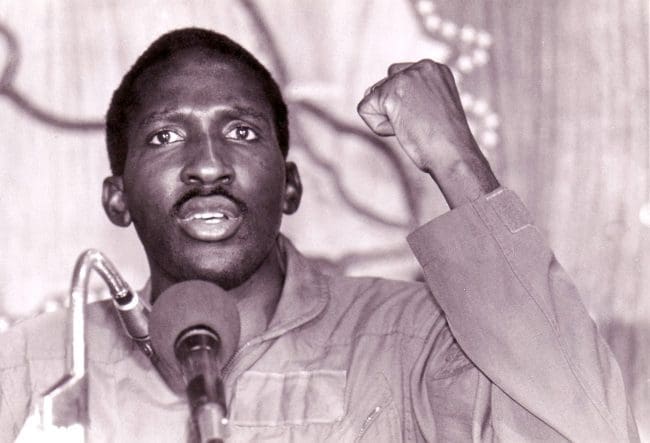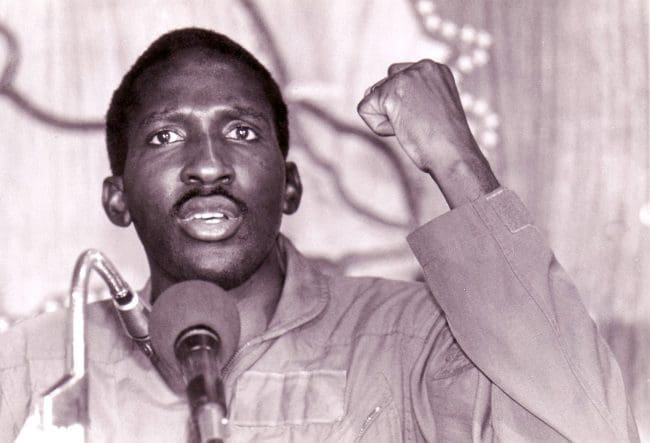
The Sahel Solidarity Campaign Network has called for accountability in the 1987 murder of Burkina Faso’s Thomas Sankara, marking the 38th anniversary of the revolutionary leader’s death with renewed demands for transparency.
Sankara was killed on October 15, 1987, when troops led by Blaise Compaoré assassinated him along with twelve colleagues during a meeting of the ruling National Revolutionary Council. The campaign network, in a statement released Tuesday, described the assassination as unresolved despite a 2022 military tribunal conviction that resulted in life imprisonment for Compaoré, who has lived in exile and never served his sentence.
Alimamy Bakarr Sankoh, co-founder and president of the Sahel Solidarity Campaign Network, used the anniversary to connect Sankara’s death with broader concerns about Western influence in Africa. The organization’s statement positioned the assassination within what it characterizes as a pattern of foreign interference that continues to affect the Sahel region today.
The group’s statement drew parallels between events separated by decades, linking Sankara’s killing to contemporary political developments in Mali, Burkina Faso, and Niger. Those three nations experienced military coups between 2020 and 2023, with the new governments subsequently withdrawing from the Economic Community of West African States and forming their own alliance.
Sankara governed Burkina Faso from 1983 until his death, implementing policies that included vaccination campaigns, infrastructure projects, and women’s rights initiatives. His administration challenged traditional French influence in the former colony, renaming the country from Upper Volta to Burkina Faso, which translates as “Land of Upright People.” His government gradually lost popular support amid internal conflicts before the coup that ended his rule.
The advocacy network’s statement referenced what it termed “anti-African rhetoric” from Western governments, specifically mentioning current U.S. President Donald Trump and European leaders. These claims about foreign policy approaches reflect tensions between some Sahel governments and their former colonial powers, particularly France, over security arrangements and economic relationships.
Compaoré ruled Burkina Faso for 27 years following Sankara’s death, maintaining close ties with Western governments during his tenure. The trial for Sankara’s murder only proceeded after popular unrest forced Compaoré from power in 2014, allowing investigations that had been suppressed for decades to move forward.
The Sahel Solidarity Campaign Network’s statement advocated for the current military governments in Mali, Burkina Faso, and Niger, describing their leaders as addressing terrorism and protecting sovereignty. These governments have faced international criticism over democratic backsliding and human rights concerns, though the campaign network frames their actions as necessary responses to security challenges.
Questions about foreign involvement in Sankara’s assassination have persisted since 1987, with various theories circulating about which external actors may have supported or encouraged the coup. The 2022 trial focused primarily on domestic conspirators, though debates about potential international connections remain unresolved in public discourse.
The statement called for monuments and structures honoring Sankara, acknowledging efforts in Burkina Faso and elsewhere to preserve his memory. Sankara’s image appears on murals across Africa, and his speeches continue circulating on social media, particularly among younger generations interested in Pan-African ideology and anti-colonial perspectives.
Current Burkina Faso leader Captain Ibrahim Traoré has invoked Sankara’s legacy while governing under military rule since 2022. The government faces an ongoing insurgency linked to groups affiliated with al-Qaeda and Islamic State, a security crisis that has displaced millions and complicated governance across the Sahel region.
The anniversary statement reflects broader debates about African sovereignty, resource control, and relationships with former colonial powers. These discussions have intensified as Sahel governments reassess security partnerships and seek alternative allies, including Russia, while distancing themselves from traditional Western partners.
The Sahel Solidarity Campaign Network operates as an advocacy organization focused on the West African region, though details about its funding, membership structure, and operational scope remain limited in public sources. The group’s statement represents one perspective in complex debates about governance, security, and international relations in the Sahel.
Sankara’s assassination continues resonating in African political discourse nearly four decades later, symbolizing tensions between revolutionary aspirations and political realities. His death at age 37 cut short a leadership style that challenged conventional approaches to development and foreign relations, leaving questions about what his continued governance might have achieved.
The call for accountability arrives as Burkina Faso grapples with security challenges that have escalated significantly since 2015. Whether renewed focus on historical grievances advances current policy discussions or simply reinforces existing divisions remains an open question among observers of Sahel politics.
